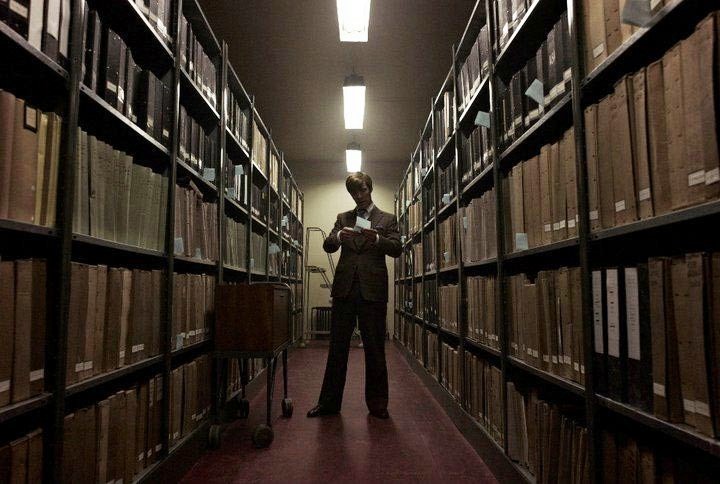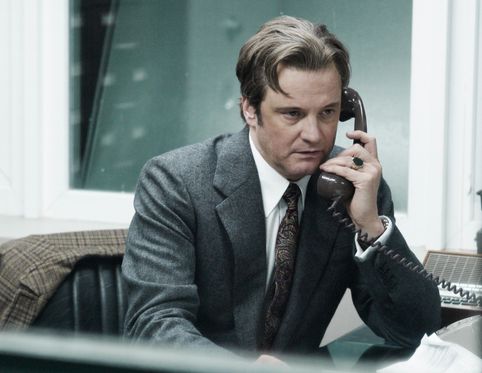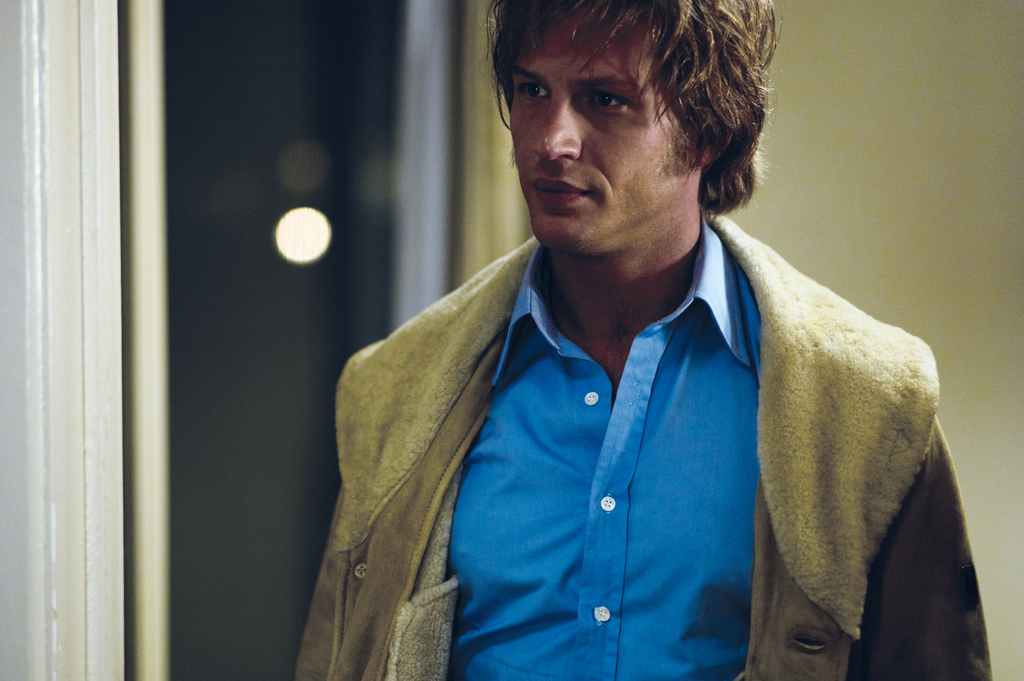Tinker, Tailor, Soldier, Spy (2011)
DIRECTOR: Tomas Alfredson
CAST:
Gary Oldman, Colin Firth, John Hurt, Benedict Cumberbatch, Tom Hardy, Mark Strong, Toby Jones, Ciaran Hinds, David Dencik, Simon McBurney, Svetlana Khodchenkova
REVIEW:
WARNING: THIS REVIEW WILL MENTION ASPECTS OF THE FILM’S PLOT
George Smiley, the protagonist of John Le Carre’s dense, slow-paced spy novels, could be described as the anti-Bond. Physically unimpressive, meek, quiet, bookish , Smiley rarely if ever engages in physical action against his usually unseen KGB counterparts. He wages wars with his mind, playing an international game of chess with his opposite numbers across the Iron Curtain. Tinker, Tailor, Soldier, Spy, generally regarded by Le Carre fans as his best novel, was previously adapted as a 1979 television miniseries starring Alec Guinness, and now has been brought to the big screen. Those wanting a white-knuckle thriller with gunfights and car chases should steer well clear, lest they be badly disappointed and probably bored out of their minds. Le Carre’s books are notoriously densely-plotted. Intense concentration is required, and even that might not be enough. I haven’t seen the 1979 six hour miniseries, so I can’t say if it related Le Carre’s plot more clearly, but the two hour film adaptation is often labyrinthine to the point of being difficult to follow. Fans of this particular sub-genre of spy thrillers are likely to enjoy themselves, but it’s questionable how much anyone else is.
, Smiley rarely if ever engages in physical action against his usually unseen KGB counterparts. He wages wars with his mind, playing an international game of chess with his opposite numbers across the Iron Curtain. Tinker, Tailor, Soldier, Spy, generally regarded by Le Carre fans as his best novel, was previously adapted as a 1979 television miniseries starring Alec Guinness, and now has been brought to the big screen. Those wanting a white-knuckle thriller with gunfights and car chases should steer well clear, lest they be badly disappointed and probably bored out of their minds. Le Carre’s books are notoriously densely-plotted. Intense concentration is required, and even that might not be enough. I haven’t seen the 1979 six hour miniseries, so I can’t say if it related Le Carre’s plot more clearly, but the two hour film adaptation is often labyrinthine to the point of being difficult to follow. Fans of this particular sub-genre of spy thrillers are likely to enjoy themselves, but it’s questionable how much anyone else is.
The film is set in Britain in the 1970s during the Cold War with the Soviet Union. The director of Secret Intelligence Services, known only by his code name, “Control” (John Hurt), is forced into retirement and dies shortly thereafter, following a botched mission in Budapest that delivers a British agent (Mark Strong) into KGB hands. Control’s right hand man, George Smiley (Gary Oldman), gets the boot along with him, but a short time later, Smiley is “unofficially” brought back by government officials seeking his help exposing a Soviet mole who has allegedly infiltrated the highest echelons of British intelligence, known as The Circus. There are four suspects—Percy Alleline (Toby Jones), Bill Haydon (Colin Firth), Roy Bland (Ciaran Hinds), and Toby Esterhase (David Dencik)–codenamed Tinker, Tailor, Soldier, and Spy. Officially retired, Smiley must work from the outside, using a very small team, and set a trap to catch the mole red-handed. In his quiet, methodical style, Smiley sets his investigation in motion, with assistance from Peter Guillam (Benedict Cumberbatch), a young agent at The Circus who jeopardizes his own career—and possibly more—by helping Smiley. And there is a “wild card” of sorts in the form of Ricki Tarr (Tom Hardy), an undercover agent gone AWOL who got wind of the mole after insinuating himself into the life—and the bed—of a Russian embassy official (Svetlana Khodchenkova) and shows up in Smiley’s house one day offering information. And, of course, as Smiley pursues the mole, he endangers both himself and those helping him.
 While James Bond fans may like to imagine otherwise, international espionage is probably more like Le Carre’s version than Ian Fleming’s. Apart from very brief spurts at the beginning and end, there’s virtually no “action”, there are no gunfights or car chases, no death-defying escapes from bad guys, no globe-trotting around glamorous international locales, and no escapades with exotic women (apart from one brief but fairly steamy sex scene between Tom Hardy and Svetlana Khodchenkova that wouldn’t be out of place in a Bond movie), just a bunch of dry, interminable conversations with a bunch of old men in suits in smoky rooms with mountains of papers. That doesn’t mean it’s entertaining to watch, however. I don’t require a film to be an action movie to hold my interest (in fact, I often find thinking man’s thrillers and dramas more interesting), but Tinker, Tailor, Soldier, Spy often gives the audience the disconcerting and somewhat headache-inducing feeling that we’ve been dropped into a “fly on the wall” position in top-secret intelligence headquarters where we get to listen in on briefings and meetings, but without being trained how to understand what anyone’s actually saying. We have to figure out as we go that “The Circus” is a code word for the intelligence headquarters, because the movie never bothers to explain this to us, and this sets the tone for everything else. The movie throws us right into the deep end of the pool and leaves us to sink or swim, and things never get completely clear, even after Tom Hardy shows up halfway through to unload a lengthy batch of exposition. We listen to an endless series of discussions that sound very serious, and we understand in an abstract, basic sense that important and dangerous games are afoot, but we never completely understand what’s going on. Bits and pieces, sure, enough to follow along to at least a generalized extent, sure, but to many—including this reviewer—Tinker, Tailor, Soldier, Spy remains a rather impenetrable and somewhat frustrating and unsatisfying experience.
While James Bond fans may like to imagine otherwise, international espionage is probably more like Le Carre’s version than Ian Fleming’s. Apart from very brief spurts at the beginning and end, there’s virtually no “action”, there are no gunfights or car chases, no death-defying escapes from bad guys, no globe-trotting around glamorous international locales, and no escapades with exotic women (apart from one brief but fairly steamy sex scene between Tom Hardy and Svetlana Khodchenkova that wouldn’t be out of place in a Bond movie), just a bunch of dry, interminable conversations with a bunch of old men in suits in smoky rooms with mountains of papers. That doesn’t mean it’s entertaining to watch, however. I don’t require a film to be an action movie to hold my interest (in fact, I often find thinking man’s thrillers and dramas more interesting), but Tinker, Tailor, Soldier, Spy often gives the audience the disconcerting and somewhat headache-inducing feeling that we’ve been dropped into a “fly on the wall” position in top-secret intelligence headquarters where we get to listen in on briefings and meetings, but without being trained how to understand what anyone’s actually saying. We have to figure out as we go that “The Circus” is a code word for the intelligence headquarters, because the movie never bothers to explain this to us, and this sets the tone for everything else. The movie throws us right into the deep end of the pool and leaves us to sink or swim, and things never get completely clear, even after Tom Hardy shows up halfway through to unload a lengthy batch of exposition. We listen to an endless series of discussions that sound very serious, and we understand in an abstract, basic sense that important and dangerous games are afoot, but we never completely understand what’s going on. Bits and pieces, sure, enough to follow along to at least a generalized extent, sure, but to many—including this reviewer—Tinker, Tailor, Soldier, Spy remains a rather impenetrable and somewhat frustrating and unsatisfying experience.
 Unsurprisingly considering an assembled ensemble of some of the best character actors in Britain, there’s no problem with the acting, but the film’s coldness keeps us distanced from everyone. This is a cool and cerebral film, populated by characters, including Smiley himself, who come across rather cold, manipulative, and morally ambiguous (to be fair, these are probably desirable personality traits for cloak-and-dagger international espionage). Gary Oldman, as low-key and subdued as he’s ever been (there is only one brief moment where he so much as raises his voice), plays Smiley as outwardly meek, emotionally aloof, and methodical. Oldman plays his quiet chess master effectively, but as protagonists go, Smiley is not very interesting. In fact, he is impenetrably inscrutable and virtually outwardly emotionless to the point of having little discernible personality beyond a vague repressed world-weariness, his soul ground down from a lifetime in one of the most ruthless and paranoid professions on Earth. John Hurt, despite being dead before the opening credits stop rolling, still gets a fair amount of screentime via flashbacks, and livens things up with cantankerous one-liners whenever he appears (if Hurt hadn’t been available, it would be easy to see Ian McKellen in this role). Mark Strong plays a field agent with a quiet intensity and ambiguous motives, and Colin Firth, Toby Jones, Ciaran Hinds, and David Dencik sit around a room having oh-so-very serious conversations and, of course, making us play the guessing game of which one of them is the mole. Benedict Cumberbatch plays Smiley’s sidekick-of-sorts with earnestness, is front and center in one of the movie’s most suspenseful scenes, and als
Unsurprisingly considering an assembled ensemble of some of the best character actors in Britain, there’s no problem with the acting, but the film’s coldness keeps us distanced from everyone. This is a cool and cerebral film, populated by characters, including Smiley himself, who come across rather cold, manipulative, and morally ambiguous (to be fair, these are probably desirable personality traits for cloak-and-dagger international espionage). Gary Oldman, as low-key and subdued as he’s ever been (there is only one brief moment where he so much as raises his voice), plays Smiley as outwardly meek, emotionally aloof, and methodical. Oldman plays his quiet chess master effectively, but as protagonists go, Smiley is not very interesting. In fact, he is impenetrably inscrutable and virtually outwardly emotionless to the point of having little discernible personality beyond a vague repressed world-weariness, his soul ground down from a lifetime in one of the most ruthless and paranoid professions on Earth. John Hurt, despite being dead before the opening credits stop rolling, still gets a fair amount of screentime via flashbacks, and livens things up with cantankerous one-liners whenever he appears (if Hurt hadn’t been available, it would be easy to see Ian McKellen in this role). Mark Strong plays a field agent with a quiet intensity and ambiguous motives, and Colin Firth, Toby Jones, Ciaran Hinds, and David Dencik sit around a room having oh-so-very serious conversations and, of course, making us play the guessing game of which one of them is the mole. Benedict Cumberbatch plays Smiley’s sidekick-of-sorts with earnestness, is front and center in one of the movie’s most suspenseful scenes, and als o has a surprising moment where he provides one of this dry, cold movie’s two genuine flickers of emotion. The other is supplied by a blond, shaggy-haired Tom Hardy, who pulls a distinct character out of what could have been a throwaway bit part, and his subplot, in which he seduces Svetlana Khodchenkova’s Irina under ulterior motives, develops genuine feelings for her, then is unable to save her, is the most engaging section of the movie (with a little expansion, one could easily imagine it making its own movie unto itself). The movie paints a less-than-appealing view of these characters’ lifestyles. Most of them, including Smiley, seem to have no lives beyond their job, and the only ones who have someone they care for–Guillam and Ricki–end up paying the price of forming attachments. An advertisement for international espionage, this is not; in fact, it’s thoroughly painted as lonely, soul-sucking, paranoid, and depressing (“I don’t want to end up like all of you”, Ricki says of his older superiors at one point, and we understand the sentiment). Given Le Carre’s alleged insider knowledge, this may well be accurate.
o has a surprising moment where he provides one of this dry, cold movie’s two genuine flickers of emotion. The other is supplied by a blond, shaggy-haired Tom Hardy, who pulls a distinct character out of what could have been a throwaway bit part, and his subplot, in which he seduces Svetlana Khodchenkova’s Irina under ulterior motives, develops genuine feelings for her, then is unable to save her, is the most engaging section of the movie (with a little expansion, one could easily imagine it making its own movie unto itself). The movie paints a less-than-appealing view of these characters’ lifestyles. Most of them, including Smiley, seem to have no lives beyond their job, and the only ones who have someone they care for–Guillam and Ricki–end up paying the price of forming attachments. An advertisement for international espionage, this is not; in fact, it’s thoroughly painted as lonely, soul-sucking, paranoid, and depressing (“I don’t want to end up like all of you”, Ricki says of his older superiors at one point, and we understand the sentiment). Given Le Carre’s alleged insider knowledge, this may well be accurate.
Tinker, Tailor, Soldier, Spy is technically well-made—the acting is uniformly solid in a quiet, low-key, non-flashy way, and for cinema buffs, there’s moments to savor in a rock-solid collection of British thespians doing stately, restrained work devoid of over-dramatic histrionics. Tomas Alfredson does a highly effective job of making Cold War-era Britain look bleak and grim, and the movie generates a sense of an uneasy, paranoid atmosphere where no one seems to completely trust anyone, even—and sometimes maybe especially—the people they’re sitting in the room talking to, but I’d be lying if I said I found it a satisfying experience. Apart from the beginning sequence, the movie defines low-burn, with a couple moderately suspenseful scenes, particularly when Peter tries to steal files from inside The Circus, and another where Ricki realizes an ambush is underway, but there aren’t many moments to get viewers’ pulses moving quicker. The cold, unlikable characters and aloof tone keep us from connecting to anyone (Benedict Cumberbatch and Tom Hardy each have a moment where they break down in tears, but it’s too little, too late). The movie barrages us with too much information and exposition too fast, with the result a bit mind-boggling. Most problematic, the resolution is anticlimactic. After all the convoluted tension leading up to the mole’s outing, we’re left with a feeling of “is that all?”. I don’t necessarily object to a movie that requires a lot of concentration–I’m a big fan of both Inception and The Prestige, for example–but Tinker, Tailor, Soldier, Spy doesn’t have enough of a payoff to make the effort worthwhile.
I’m not damning Tinker, Tailor, Soldier, Spy, and I freely admit that perhaps I’m just not the target audience with the proper mindset to appreciate Le Carre’s style, but the movie left me feeling lost at times, and with a feeling of empty dissatisfaction when it was over. Fans of the sub-genre may well feel very differently, but for me, Tinker, Tailor, Soldier, Spy left me cold and in the dark.
**1/2